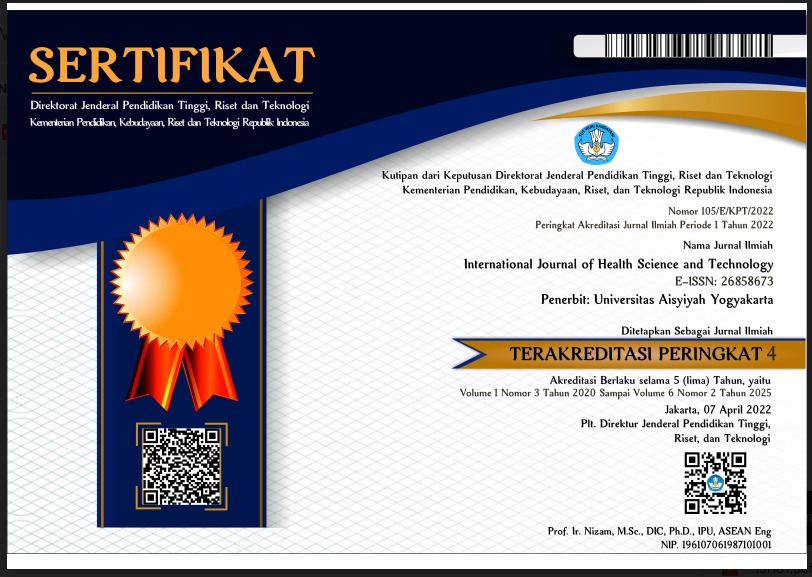The role of mosques in educating rural muslim communities to prevent the Covid-19 Pandemic
DOI:
https://doi.org/10.31101/ijhst.v4i1.2534Abstract views 437 times
Keywords:
education, crowd, mosque, Covid-19 preventionAbstract
References
Arifin, I. (2022). Dampak Pandemi Covid-19 Bagi Ibadah Shalat Jumat Pada Masyarakat Perkotaan Di Jombang Dan Sidoarjo. 4(2), 258–271. https://doi.org/10.20414/sangkep.v2i2.p-ISSN
Aryati, A., Susilowati, T., Boukri, S., & Iqbal, M. (2020). Understanding Character Education and Experiential Learning Process in 21 st Century Education in Indonesia. Journal of University of Shanghai for Science and Technology, 22(11), 217–232. https://jusst.org/wp-content/uploads/2020/11/Understanding-Character-Education-and-Experiential-Learning-Process-in-21-st-Century-Education-in-Indonesia.pdf
Centers for Disease Control and Prevention. (2020). How to Protect Yourself & Others. Centers for Disease Control and Prevention. https://www.cdc.gov/coronavirus/2019-ncov/prevent-getting-sick/prevention.html
Dinas Kesehatan Boyolali. (2020). Monitoring Data Kabupaten Boyolali. Dinas Kesehatan Boyolali. https://dinkes.boyolali.go.id/covid19
Fahiza, Z., & Siti Nur Zalikha. (2021). Kebijakan Pemerintah dalam Kegiatan Shalat Berjamaah di Masa Pandemi Covid-19. Jurnal Riset Dan Pengabdian Masyarakat, 1(1), 48–55. https://doi.org/10.22373/jrpm.v1i1.629
Faiz, F. R. F., Nurhadi, N., & Rahman, A. (2021). Pembentukan Sikap Disiplin Siswa Pada Sekolah Berbasis Asrama. QALAMUNA: Jurnal Pendidikan, Sosial, Dan Agama, 13(2), 309–326. https://doi.org/10.37680/qalamuna.v13i2.902
Grimalda, M. A., Rahman, A., & Hermawan, Y. (2021). INSANIA: Jurnal Pemikiran Alternatif Kependidikan Strategies for Developing Students’ Character Through Humanist Learning Strategi Pembentukan Karakter Siswa Melalui Pembelajaran Humanis. 26(2), 248–264. https://doi.org/DOI: https://doi.org/10.24090/insania.v26i2.6000
Hasibuan, E. M., & Yusram, M. (2020). Hukum Salat Berjemaah Di Masjid Dengan Saf Terpisah Karena Wabah Covid-19. BUSTANUL FUQAHA: Jurnal Bidang Hukum Islam, 1(2), 106–124. https://doi.org/10.1093/trstmh/traa025.1
Hidayati, D. A., Habibah, S., & Ratnasari, Y. (2022). Strategi Bertahan Hidup Pedagang Pasar Tradisional di Masa Pandemi Covid-19 (Studi pada Pedagang Kecil di Pasar Koga, Kecamatan Kedaton Kota Bandar Lampung). Jurnal Ilmiah Kajian Ilmu Sosial Dan Budaya, 24(1), 39–56. http://jurnalsosiologi.fisip.unila.ac.id/index.php/jurnal%0D
Imami, F. Q., Trinugraha, Y. H., & Rahman, A. (2021). Peran Ibu sebagai Orang Tua Tunggal dalam Mendukung Pendidikan Anak di Masa Pandemi Covid-19. Journal of Education, Humaniora and Social Sciences (JEHSS), 4(2), 793–800. https://doi.org/10.34007/jehss.v4i2.747
Kemenkes. (2020). Situasi Terkini Perkembangan Covid-19. Kemenkes RI. https://covid19.kemkes.go.id/category/situasi-infeksi-emerging
Nasir, A., & Salat, S. (2020). Social Distancing dalam Saf Salat Berjamaah; Perbandingan Ulama dalam Mazhab. 2(1), 29–36. https://doi.org/https://doi.org/10.24252/mh.v2i1.14281
Nasution, N. H.W. (2020). Manajemen Masjid Pada Masa Pandemi Covid 19 Oleh: Dr. Nurseri Hasnah Nasution, M.Ag 1 Dr. Wijaya, M.Si. 2. Manajemen Masjid Pada Masa Pandemi Covid 19, 2(1), 1.
Nurdin, Z. (2021). The Culture of Thahârah in the Corona Virus Disease Pendemic: an Offer to Prevent the Spread of Covid-19 with Islamic Jurisprudence Approach. Madania: Jurnal Kajian Keislaman, 24(2), 223. https://doi.org/10.29300/madania.v24i2.3524
Pemerintah Provinsi Jawa Tengah. (2020). Statistik Kasus Covid-19 Jawa Tengah. Pemerintah Provinsi Jawa Tengah. https://corona.jatengprov.go.id/data
Saefulloh, A., Famularsih, S., Syarif, M., Adimarta, T., & Helmy, M. I. (2021). Covid-19 Prevention (Study of Covid-19 Protocol and Relationship of Wudhu). The Journal of Society and Media, 5(1), 99. https://doi.org/10.26740/jsm.v5n1.p99-118
Savitri, A. R. E., Rahman, A., & Hermawan, Y. (2022). Pengaruh Kecemasan dan Motivasi Belajar dalam Pembelejaran Daring di Masa Pandemi Covid-19 Terhadap Hasil Belajar Sosiologi Siswa Kelas XII SMA Batik 1 Surakarta. JISIP (Jurnal Ilmu Sosial Dan Pendidikan), 6(1), 2148–2155. https://doi.org/10.36312/jisip.v6i1.2569
Suryani, B. (2020). Ada 800.000, Masjid di Indonesia Terbanyak di Dunia. Harian Jogja. https://news.harianjogja.com/read/2020/02/27/500/1032953/ada-800.000-masjid-di-indonesia-terbanyak-di-dunia
Valenzania, V., & Rahman, A. (2022). The Effect of Social Media and Service Quality on Blood Donor Participation at UDD PMI Klaten Regency. 5(36), 2478–2484. http://www.iocscience.org/ejournal/index.php/mantik/article/view/2019/1594
Wahid, A. (2020). Pelaksanaan Shalat Berjamaah Di Masa Pandemi Covid-19 Perspektif Maqashid Syariah Serta Implikasinya Terhadap Ketahanan Ekonomi Keluarga. Antaradhin: Jurnal Ekonomi Syariah Kontemporer. http://jurnal.iailm.ac.id/index.php/antaradhin/article/view/277
Zulfikar, E. (2020). Tindakan Preventif atas Penyebaran Covid-19 dalam Perspektif Hadis. Diroyah: Jurnal Studi Ilmu Hadis, 5(1), 31–44. https://doi.org/10.15575/diroyah.v5i1.8924
Downloads
Additional Files
Published
How to Cite
Issue
Section
License
International Journal of Health Science and Technology allows readers to read, download, copy, distribute, print, search, or link to its articles' full texts and allows readers to use them for any other lawful purpose. The journal allows the author(s) to hold the copyright without restrictions. Finally, the journal allows the author(s) to retain publishing rights without restrictions
- Authors are allowed to archive their submitted article in an open access repository
- Authors are allowed to archive the final published article in an open access repository with an acknowledgment of its initial publication in this journal

This work is licensed under a Creative Commons Attribution-ShareAlike 4.0 Generic License.










